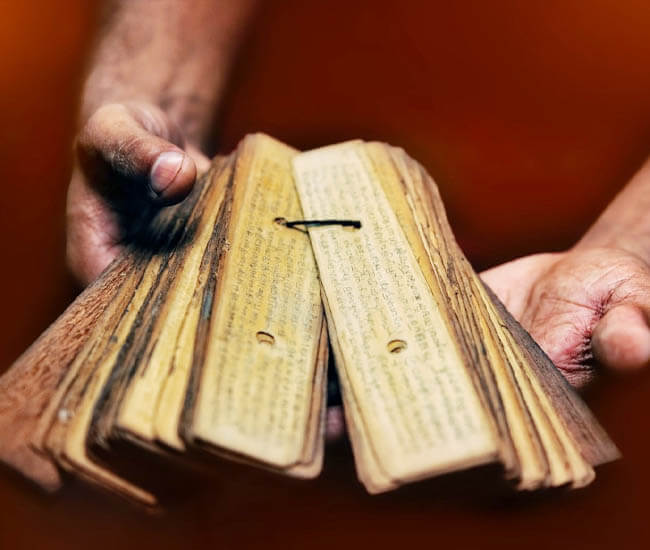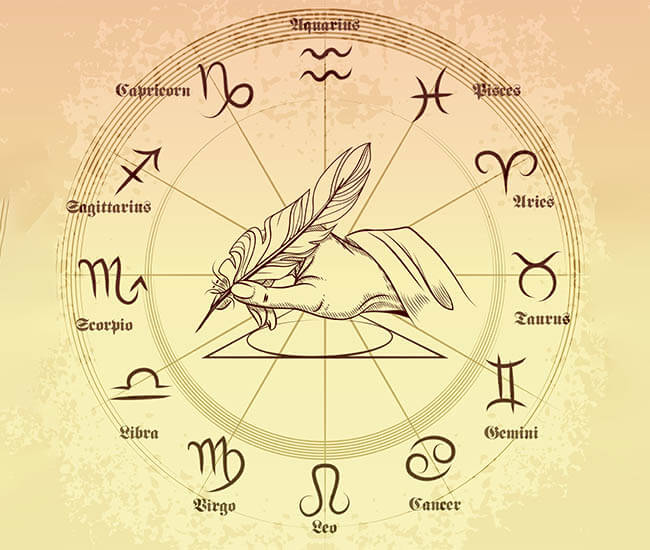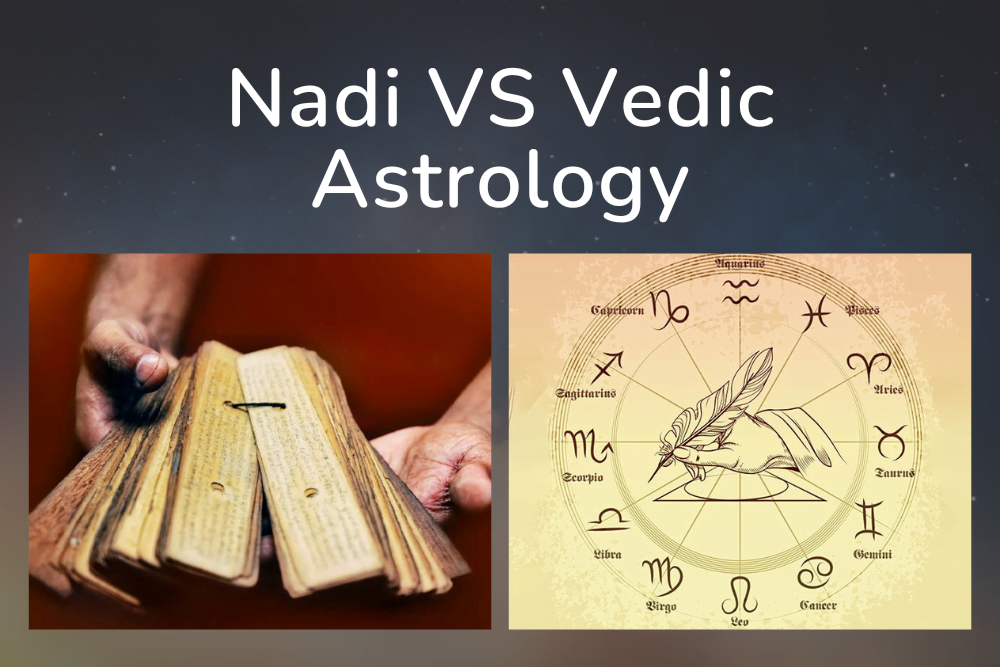Difference Between Nadi Astrology & Vedic Astrology
Astrology, an age-old practice cherished across cultures, provides a unique perspective for individuals trying to make sense of their lives. In India, the captivating realms of Nadi Astrology and Vedic Astrology have stood the test of time, capturing the imaginations of seekers for centuries. Join us as we delve into the fascinating world of these mystical practices, exploring their origins, methodologies, and distinctive features.
What is Nadi Astrology?
Nadi Astrology, believed to have originated in Tamil Nadu, Southern India, stands as a unique predictive system. At its core are palm-leaf manuscripts, said to have been meticulously inscribed by ancient sages thousands of years ago. These manuscripts delve into the lives of individuals, encapsulating details about their past, present, and future.
Each person, according to Nadi Astrology, possesses a distinct set of palm leaves awaiting discovery. The process involves the astrologer using the individual’s thumbprint to identify the correct manuscript and interpret the wealth of information contained within.
One distinguishing feature of Nadi Astrology is its specificity. Predictions cover a broad spectrum, from personal details like family background and education to more intricate aspects such as health, career, and marriage. The accuracy of Nadi predictions has made it a widely practiced and revered system, not only in India but also across the globe. If you wish to find a good nadi astrologer in Mumbai, here are 7 factors to consider while choosing the best nadi astrologer in Mumbai
What are the types of Nadi Astrology?

Nadi Astrology offers various approaches, with different types focusing on specific aspects. People commonly choose from these variations to gain insights into their lives and destinies.
1. Naadi Jyotish:
The most popular form, predominantly practiced in Tamil Nadu, uses thumbprints to identify the correct set of palm leaves and make predictions about an individual’s life.
2. Agastya Nadi:
Named after the sage Agastya, this form is believed to contain information about past, present, and future lives, widely practiced in Tamil Nadu.
3. Suka Nadi:
Rooted in the teachings of Sage Suka, it provides insights into an individual’s spiritual path, often sought by those in search of spiritual guidance.
4. Brahma Nadi:
Named after the creator god Brahma, it is said to contain information about a person’s past, present, and future lives.
5. Kausika Nadi:
Attributed to the sage Kausika, it is believed to provide information about an individual’s karma, offering guidance on overcoming karmic obstacles.
What is Vedic Astrology?
In contrast, Vedic Astrology, also known as Jyotish or Hindu Astrology, boasts a rich history dating back over 5,000 years. The term “Vedic” refers to the Vedas, the oldest sacred texts of Hinduism, forming the philosophical foundation for this ancient astrological system.
Vedic Astrology operates on the principle that the positions and movements of celestial bodies Sun, Moon, planets, and stars, hold profound influence over human lives and events. Birth charts, derived from an individual’s time, date, and place of birth, become the cosmic blueprint used for predictions.
Unlike Nadi Astrology’s palm leaves, Vedic Astrology uses a sidereal zodiac, based on the actual positions of stars, as opposed to the tropical zodiac employed in Western Astrology. The focus extends beyond individual lives, encompassing the cycles of time and larger forces shaping human destinies.
What are the types of Vedic Astrology ?

Within Vedic Astrology, various branches or types offer nuanced perspectives. These include:
1. Jaimini Astrology:
Based on the teachings of Sage Jaimini, it analyzes planetary positions to unveil an individual’s dharma or life purpose.
2. Bhrigu Astrology:
Rooted in the teachings of Sage Bhrigu, this predictive system uses birth charts and planetary positions to make detailed predictions about an individual’s future, providing guidance for decision-making.
3. Prasna Astrology:
Also known as horary astrology, it addresses specific questions related to an individual’s life. Astrologers cast a horoscope based on the time and place of the question to make predictions.
4. Medical Astrology:
A specialized branch focusing on health, it utilizes astrological principles to identify potential health issues and recommend preventive measures.
What Are The Differences Between Nadi & Vedic Astrology in 2024
While Nadi and Vedic Astrology share roots in Hinduism, their methodologies, focuses, and acceptances differ significantly.
1. Methodology:
Nadi Astrology relies on ancient palm leaves and thumbprints, while Vedic Astrology employs birth charts calculated from the time, date, and place of birth.
2. Predictions:
Nadi Astrology is known for its specific predictions, including details like the number of siblings, profession, and potential health issues. Vedic Astrology, in contrast, provides more general predictions based on planetary positions.
3. Focus:
Nadi Astrology zooms in on individual lives, detailing past, present, and future. Vedic Astrology casts a broader net, considering larger forces shaping human destinies.
4. Authenticity:
The authenticity of Nadi Astrology, including the accuracy of palm leaf manuscripts, has faced scrutiny. Vedic Astrology, with its long history of practice and study, is widely accepted.
5. Popularity:
While both systems are practiced globally, Vedic Astrology generally holds broader popularity and recognition, especially in the Western world.
In essence, while both Nadi and Vedic Astrology offer profound insights, they stand as distinct systems with varying methodologies and focuses. The choice between them often hinges on personal preferences and beliefs.
Whether you’re curious about Nadi Astrology or Vedic Astrology, both can offer valuable insights into your life. For personalized Nadi Astrology consultations, visit our Nad Astrology Center in Navi Mumbai. Discover the secrets of your past, present, and future with our experienced Nadi Astrologer in Navi Mumbai.

